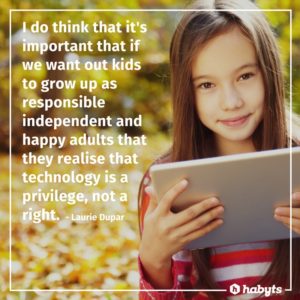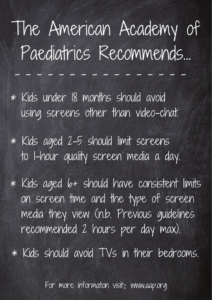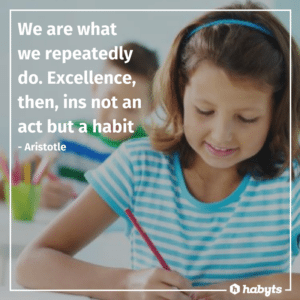“We know that kids who play video games and use technology for an hour a day are actually psychologically healthier than kids who spend 3 or more hours a day with video games and also psychologically healthier than kids who don’t spend any time at all.”
– Dr Randy Kulman, Learning Works for Kids
Do you feel like you are going around in circles when it comes to kids and screen time? You’re not alone. Action for Children recently polled parents as to the behaviours parents find most difficult to control, and screen time came in at #1. That’s right, parents found it easier to get their kids to do their homework or go to bed then to limit their screen time.
But we’re here to help with our new guide all about kids and screen time! We call it Preparing your Kids for Screen Time Success. And to give you a quick taster, we’ve pulled out several excerpts based on the questions parents ask us most about kids and screen time, including:
- How much screen time is too much?
- How and when should I talk to my child about screen time?
- How do I make my home more conducive to screen-free activities?
We’ll be exploring these questions in more detail over the course of the next few blogs. So we begin today with a long hard look at kids and screen time – What is it? Why is it such a big deal? And what’s the real issue that frustrates parents AND kids? Let’s get started.
What is screen time?
Screen time is the total time spent on electronic devices each day such as smartphones, tablets, laptops, computers, televisions and game consoles. And it quickly adds up.
According to market researcher conducted by Childwise in 2015, kids aged five-16 average 6.5 hours screen time a day, with teenage boys spending the most time on screens – an average of 8 hours a day. Thus, a typical teen can expect to spend upwards of 90 days – or 3 months – a year staring at a screen. That’s a 116% increase in screen time consumption since 1995.
And that’s not all. Kids are now adept at multi-screening – using two or more screens at the same time, for example, browsing the internet on a tablet while watching television.
Changing times (and technology)

Not only is screen time dramatically accelerating, but the role of devices in our daily lives is evolving. Today the average British household owns 7.4 connected devices. And what were once bulky items of furniture (think televisions or computers) can now be carried around in our pockets.
Kids as young as seven are getting smartphones and tablets are increasingly found in the classroom. What’s more, families often own shared devices such as a laptop or tablet, meaning toddlers can now work tablets!
All these screens – computers, consoles, smartphones, tablets and televisions – are interconnected, meaning you can put down one and carry on where you left off with another. The upshot is kids (and adults) are consuming many types of screen media, across different devices, sometimes simultaneously, and spending more time doing so than ever before.
Problems of too much screen time
Physiologist Dr Aric Sigman argues…
“…whether Facebook, the internet or computer games, screen time is no longer a cultural issue about how children spend their leisure time, nor is it confined to concern over educational value or inappropriate content – it’s a medical issue…”
Dr Aric is rightly concerned. Too much screen time has been linked to a range of health and social issues in kids. According to the American Academy of Paediatrics, these include:
“Several studies have documented that higher levels of screen time are associated with less sleep, more attention problems, and lower academic performance and involvement.”
– Source: Journal of American Medical Association Pediatrics – JAMA
But it’s not all doom and gloom. While too much screen time is an issue, balanced screen time habits create opportunities for learning, collaboration and FUN! What’s more, in our technology-dependent world, many parents don’t want their kids left behind. And as we will learn later, when it comes to kids and screen time, not all screen time is created equal.
RELATED: Looking for a more robust screen time solution? Download our guide!
Download the guide hereHow much screen time is too much?

So here’s the thing, there is no perfect Rule. For many years, the American Adacemy of Paediatrics (AAP) has issued broad guidance on screen time and kids to help parents set healthy parameters. You can see their current recommendations in the black panel opposite.
The AAP used to recommend no more than 2 hours screen time for kids per day. But in recent months, the AAP has recognised the challenges parents face in enforcing them. As we highlighted earlier, many kids are consuming far more than 2 hours screen time per day, so the AAP refreshed their guidance. Key Takeaways include:
Is all screen time created equal?
In short, time spent on educational websites, doing creative activities (e.g. creating fun graphics) or using a chat application to video-call a relative is a more valuable and constructive use of screen time than playing the latest first-person shooter. Sadly, the vast majority of kids engagement with screen media is passive and interactive rather than creative.
Finding the Right Balance
Regardless of the ‘quality’ of screen time, it’s important your kids pursue active, healthy lifestyles away from screens. Here are a few tips to help you help them achieve that balance:
- Monitor your kid’s usage and behaviour during and after screen time. If they’re grouchy or aggressive, this could be an indicator the screen media they are consuming is low value.
- Consider introducing an upper limit on daily screen time for the whole family.
- Create a screen time schedule setting out how much screen time is allowed each day and when it is and isn’t appropriate, for example, not before homework. (Take the Habyts Screen Score Assessment to identify the Optimal Screen Routine for your child).
- No screens in the bedroom (including televisions) and ensure they are switched off one hour before bedtime to allow young minds to unwind.
- Practice what you preach and set a good example for your kids while making time for plenty of unplugged family activities.
In fact, another way to look at effectively managing screen time in your family is to ask yourself this: Are you consistently achieving a healthy balance with non-screen activities? But there’s something more, and it’s the underlying source of frustration for parents and kids.
Kids and screen time: the consistency killer

Whether it’s managing the quantity or quality of screen time usage, setting sensible limits or enforcing screen time rules, a lack of consistency can kill your good intentions.
Let’s be honest, teaching kids good screen time habits can be time-consuming and emotionally draining. Even when we know it affects kids’ health, social skills, and academic success as well as giving them critical life skills – such as self-regulation, delayed gratification, and resilience.
So what kills consistency? Hectic lives. Multiple devices. Shifting schedules. Ever-changing technology! Many parents are just trying to stay ahead of daily screen time skirmishes (while juggling work and family life). But our hectic world of rapidly accelerating screen use doesn’t negate the need for consistent habits – if anything, it amplifies it. That’s because, according to researchers at Duke University, habits account for about 40 percent of our behaviour!
All kids require some level of structure, routine and consistency to build good habits and critical life skills. (And parents need better tools to help kids build those habits in the modern world). Whether it’s responsible screen usage or other life skills…that’s just how habits work!
That’s the facts and hack on kids and screen time. Now it’s over to you! Do you limit your kid’s screen time? And how many hours do you allow them a day? We’d love to know your thoughts!